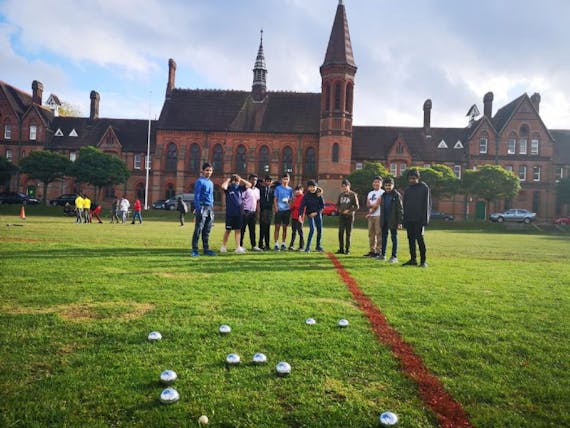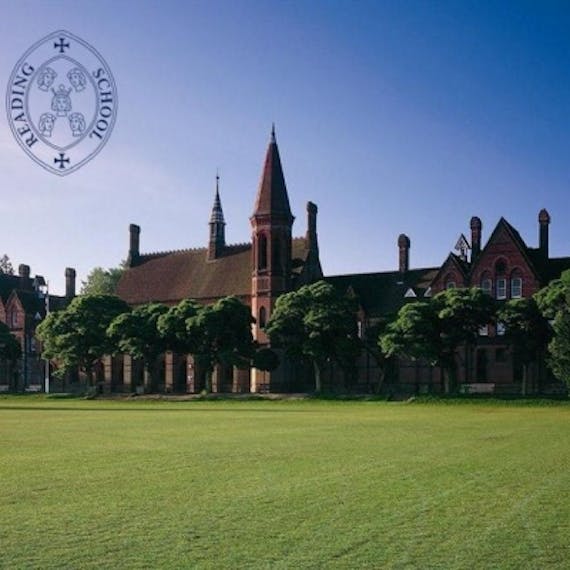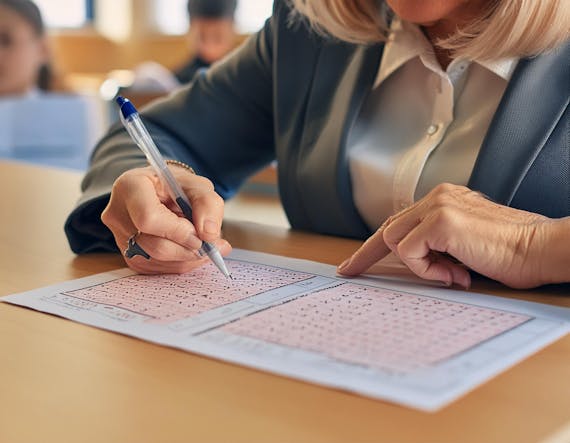Reading School 11+
Crucial 11+ info, past 11+ papers and practice 11+ papers for Reading School.
How to get into Reading School
Reading School is a selective secondary school in Berkshire. To get into Reading School children need to pass the school's 11+ entrance test. Here is the step-by-step guide to getting your child into Reading School with all the important information you need to know.
Admission Requirements
Children born between 1st September 2014 and 31st August 2015 are eligible for Year 7 entry in September 2026 (see key dates). Reading School offers a total of 150 places annually, comprising 138 day places (minimum) and 12 boarding places (maximum) [1].
All boys must take the FSCE 11+ entrance examination to be considered for admission. Passing the examination does not guarantee a place as the school typically receives more qualified applicants than available places [1].
Living within the catchment area provides significant advantages for place allocation, though residence in the area is not required to sit the entrance examination. Day places are first offered to applicants who perform well enough in the tests and reside within the catchment area, with candidates outside the catchment area only considered if further places remain available [1].

Key Dates and Application Process
Entrance test registration opens on Tuesday 1st April 2025 and closes at midday on Friday 13th June 2025 (see key dates) [1]. The entrance examination takes place on Friday 5th September 2025 (see key dates).
Test results become available online by mid-October 2025 (see key dates) [1]. Families can then use these results to complete their secondary school application by 31st October 2025 (see key dates).
Families must submit their Common Application Form through their local authority by 31st October 2025 (see key dates). School place offers are confirmed on 2nd March 2026 (see key dates).

- Register for the entrance test directly with Reading School between 1st April and 13th June 2025
- Take the FSCE 11+ examination on 5th September 2025
- Receive results in mid-October 2025
- Submit the Common Application Form by 31st October 2025
- Receive school place offers on 2nd March 2026
The FSCE 11+ Examination
Reading School uses the FSCE 11+ examination designed by Future Stories Community Enterprise. From September 2025, the test covers subjects from the Key Stage 2 curriculum including art and design, computing, design and technology, English, geography, history, languages, mathematics, music, physical education, and science.
The examination consists of four separate tests taken on the same day with short breaks between papers. Papers include multiple choice and free response questions based on the curriculum up to the end of Year 5.
A creativity component is included but only assessed if students achieve eligible scores in the other papers. The school defines creativity as "the ability to think of new and imaginative ideas, or to solve problems in original and unique ways" .

- Four papers covering multiple Key Stage 2 curriculum subjects
- Mix of multiple choice and free response question formats
- Additional creativity assessment for eligible candidates
- No commercially available practice papers for FSCE tests [1]
Oversubscription Criteria
Children with an Education, Health and Care Plan naming Reading School who meet qualifying standards are allocated places first. Priority is then given to looked after and previously looked after children, followed by children receiving Pupil Premium or Service Premium who live within the catchment area [1].
Up to 15 places are reserved for boys who pass the sporting aptitude assessment and live within the catchment area. Remaining places go to children living within the school catchment area based on exam performance [1].
- Education, Health and Care Plans naming Reading School
- Looked after and previously looked after children
- Children receiving Pupil Premium or Service Premium within catchment
- Sporting aptitude places (up to 15) within catchment area
- Catchment area residents by exam performance ranking
- Non-catchment applicants only if places remain available
Catchment Area
Reading School's catchment area includes the following postcodes: RG1, RG2, RG4, RG5, RG6, RG7, RG8, RG10, RG12, RG18, RG19, RG30, RG31, RG40, RG41, RG42, RG45, plus specific sectors within RG9, RG14, RG20, RG26, RG27, GU15, GU17, GU19, GU46, GU47, and parts of OX10 and OX11.
Living within the catchment area significantly affects how available school places are allocated to successful candidates. Families can check the official catchment area map on the school's website for detailed boundaries.
For specific catchment verification, families should contact the school information section for authoritative confirmation of their address status.
Preparation Guidance
Reading School provides support for eligible students in Categories 1 and 2 of their admissions policy, including at least 10 hours of online familiarisation materials [1]. Year 12 students run familiarisation sessions in Mathematics and English for primary school children [1].
The school asserts that by focusing on Key Stage 2 National Curriculum areas taught up to the end of Year 5, the revised test is designed to eliminate the need for tutoring. The admissions test is based on the primary school curriculum for English and Mathematics [1].
Families seeking additional preparation support can access practice papers or consider professional tutoring services. Child psychologists recommend regular study sessions of 20-30 minutes for children aged 10-11.
- Start preparation with "little and often" approach using 20-30 minute sessions
- Focus on Key Stage 2 curriculum up to end of Year 5
- Use school familiarisation materials for eligible students
- Attend school-run preparation sessions when available
- Practice exam timing and multiple question formats
Sporting Excellence Pathway
Reading School operates the Kenwrick Sports Pathway which allows up to 10% of Year 7 students to participate in a programme championing sporting excellence. Children demonstrating sporting aptitude who live within the catchment area are eligible.
The sporting aptitude assessment takes place on Saturday 20th August 2025 (see key dates). Children demonstrate their sporting potential through various tests and tasks overseen by independent assessors.
Children are only eligible for sporting aptitude places if they achieve eligible scores in English and mathematics entrance tests. Up to 15 places are allocated by rank order of sporting aptitude assessment performance [1].
Practical Exam Day Advice
The examination is taken on paper with answers written in provided spaces. Instructions are delivered via voice recording. Student details are pre-written on answer sheets and checked at the start of each test.
At least one invigilator is available to help if students need support. Families should ensure children arrive prepared with appropriate stationery and understand the examination format beforehand.
On the day, children should focus on reading instructions carefully and managing their time across all four papers. Regular practice with timed conditions helps build confidence for the actual examination experience.
- Arrive early and bring required stationery
- Listen carefully to audio instructions for each paper
- Check personal details on answer sheets
- Manage time effectively across four separate papers
- Use invigilator support if needed during the examination
Support for Disadvantaged Families
Applicants receiving Pupil Premium, or who are looked after or previously looked after, receive priority when place offers are made [1]. Reading School provides a £200 transport grant, £100 annual uniform grant, and £50 annual sports kit grant for eligible families [1].
Assistance is provided automatically with minimal administrative burden to maintain family confidentiality [1]. Additional support includes fee-free lockers and free essential equipment including laboratory coats and safety goggles [1].
Families requiring financial support should contact the school information section for guidance on available assistance programmes and application procedures.
Alternative School Options in Berkshire
Families should consider multiple school options when completing their Common Application Form. Berkshire offers several selective schools including Kendrick School (girls' grammar), plus grammar schools in the Slough area such as Langley Grammar School and Herschel Grammar School.
Reading Girls' School provides a partially-selective option with places available through both general admission and selective stream testing. Families may also consider grammar schools in neighbouring Buckinghamshire which operate different entrance examinations and application timelines.
When selecting preferences, families should include schools where their child has realistic chances of gaining admission based on academic performance, catchment area residence, and school-specific admission criteria.
FSCE 11+ Information
In order to get into Reading School, children need to pass the FSCE 11+. This 11+ test is written by FSCE for use by the school's admissions process.
FSCE 11+ Subjects & Structure
The FSCE 11+ requires children to complete tests in the following subjects:
- English
- Maths
- Creative Writing
To gain admission to Reading School, prospective students are required to take the 11 plus exam administered by Future Stories Community Enterprise (FSCE), a subsidiary of the school. The assessment consists of three distinct papers designed to evaluate the candidate's abilities in various areas.
The English paper assesses the child's proficiency in reading comprehension, vocabulary, and spelling. The Maths paper tests the applicant's understanding and application of Key Stage 2 mathematical concepts. Lastly, the Creative Writing paper requires the student to compose an original piece of writing based on a given prompt.
The English and Maths papers feature a mix of multiple-choice and free response questions. For multiple-choice questions, students must shade the correct answer on their answer sheet. Free response questions require the student to write their answers in designated answer boxes, with only one number or letter per box.
Other Schools using FSCE 11+
As well as Reading School, several other schools also use FSCE 11+. These are:
FSCE 11+ Marking Process
The reality of 11+ tests, selective education and academic institutions such as Reading School is that only children with particularly high marks are admitted. Hence why it is important that children perform well in their 11+ papers.
Different schools (and different 11+ tests) have different marking processes. Some tests are marked in person, some remotely, while others utilise computer-based optical recognition technologies for quickly marking multiple-choice answer sheets.

Many 11+ tests are age-standardised to ensure younger children are not disadvantaged (i.e. their marks may be moderated depending on the month in which they were born). While creative writing papers can be used as tie-breakers, multiple-choice tests in Maths, Comprehension, Verbal Reasoning and Non-Verbal Reasoning normally make up the bulk of a child's marks. The specific details and weightings can vary from year to year.
It's worth remembering that once children's 11+ tests are being marked, the admissions process is completely outside of the parents' control. Hence, parents should not worry themselves about whether their child has got a place!
FSCE 11+ Pass Mark
The pass mark for the FSCE 11+ changes every year and isn't generally made public knowledge. This is due to the academic strength of the children taking the test varying and how challenging the test ends up being (as well as plenty of other smaller variables).

Hence, as a vague rule-of-thumb, it's recommended that children aim for roughly 75-80% in their practice tests. Whilst this won't guarantee them a place at Reading School, it's a ballpark exam result figure for successful candidates.
11+ Tutor for Reading School
As the FSCE 11+ entrance process is particularly gruelling, we would highly recommend using an 11+ private tutor.
Why use a private 11+ tutor?
Personal tutors have the experience and expertise to help children pass their 11+ exams. They know the requirements of the FSCE 11+ tests inside-out and can provide tailored support to give children the best possible chance of success. It's also important to bear in mind that plenty of other children will be using private tutors too.
11+ tutors don't need to be face-to-face, plenty of children use online 11+ tutors.

11+ tutors can also provide regular progress reports and feedback, helping parents to monitor their child's progress and make any necessary adjustments to their preparation.
Most importantly, using an 11+ tutor helps ensure that the preparation work gets done!
Private 11+ Tutors for the Reading School 11+ Tests
We have a range of private tutors who specialise in preparing children for the Reading School 11+ entrance tests. Please click here to be put in touch with a range of excellent 11+ private tutors from our friends at exams.courses.
11+ Past Papers for Reading School
Unfortunately, Reading School has not made any of their 11+ past papers publicly available. However, you can use However, you can use 11+ practice papers from other exam boards (such as GL Assessment, CEM and CSSE) to help your child prepare.
11+ Practice Papers for Reading School
Unfortunately, there are no targeted 11+ practice papers for Reading School available. However, you can use 11+ practice papers from other exam boards (such as GL Assessment, CEM and CSSE) to help your child prepare.
School Information
Below you will find further information about Reading School together with their admissions contact details.

| Address | Reading School, Erleigh Road, Reading, Berkshire RG1 5LW |
|---|---|
| School Website | https://www.reading-school.co.uk/ |
| Telephone | 01189015600 |
| Email Address | admissions@reading-school.co.uk |
| Gender | Boys only |
| Total Year 7 Places | Unknown |
| Total Pupils (Girls/Boys) | 1119 (1 Girls / 1118 Boys) |
| Headmaster | Revd Dr Chris Evans |
Reading School is a boys only school. It is also an academy, meaning the school is run independently by a trust or sponsor and is directly funded by the central government (not the local authority).
Notably, Reading School is one of very few English grammar schools to also offer boarding facilities.
In total 1,119 pupils attend Reading School and it's led by the Headmaster, Revd Dr Chris Evans.
Reading School Location
Below you will find a map showing the school's location:
Ofsted Information
Reading School was last inspected by Ofsted on 21/11/2023 and the inspection lasted 0 days. Ofsted published their report on 31/01/2024, declaring that the school was 'Outstanding'. This information is summarised in the table below along with a link to the full report.

Last Ofsted Report Data
| Date Inspected | Inspection Duration (Days) | Reporting Date | Rating | Full Report | 21/11/2023 | 0 | 31/01/2024 | Outstanding | Full Report |
|---|
Ofsted Report Summary
The inspection of Reading School on 21 November 2023 resulted in an Outstanding overall outcome. The school achieved the highest rating across all key areas assessed by Ofsted, demonstrating exceptional performance in providing quality education, fostering positive behaviour and attitudes, promoting personal development, and exhibiting strong leadership and management.
The Quality of education was deemed Outstanding, indicating that Reading School delivers a high-standard curriculum and teaching practices that enable students to excel academically. The Behaviour and attitudes of students were also rated as Outstanding, reflecting a positive and conducive learning environment within the school.
Furthermore, the school's Personal development provision was found to be Outstanding, showcasing its commitment to nurturing well-rounded individuals. The Leadership and management of Reading School were also recognized as Outstanding, highlighting the effective governance and strategic direction of the institution. Lastly, the Sixth form provision was rated Outstanding, demonstrating the school's success in preparing students for higher education and future careers.
GCSE & A-Level Subjects
Below you will find a complete list of GCSE and A-Level subjects offered to pupils at Reading School for the 2022-23 academic year.
| GCSE Subjects Offered |
|
|---|---|
| A-Level Subjects Offered |
|
GCSE & A-Level Performance
Below are the individual GCSE and A-Level performance tables for Reading School per subject. Note that this may include children taking GCSEs early (e.g. taking a language GCSE in Year 10) or indeed a child in Year 12 retaking a GCSE.
GCSE Results Information (2022-23)
| Subject | Total Pupils | Grades Achieved | |||||||||
|---|---|---|---|---|---|---|---|---|---|---|---|
| U | 1 | 2 | 3 | 4 | 5 | 6 | 7 | 8 | 9 | ||
| Religious Studies | 49 | 1 | - | - | - | - | - | - | - | - | - |
| Ancient History | 16 | - | - | - | - | 1 | - | - | 2 | 4 | 9 |
| Biology | 148 | - | - | - | - | 1 | 1 | 7 | 28 | 36 | 75 |
| Chemistry | 150 | - | - | - | - | - | 5 | 6 | 21 | 33 | 85 |
| Computer Studies/Computing | 64 | - | - | - | 1 | - | 4 | 6 | 8 | 18 | 27 |
| Economics | 79 | - | - | - | - | 1 | - | 7 | 16 | 26 | 29 |
| Electronics | 22 | - | - | - | - | - | - | 2 | 5 | 8 | 7 |
| English Language | 148 | - | - | - | - | - | 9 | 25 | 35 | 38 | 41 |
| English Literature | 148 | - | - | - | - | 1 | 4 | 16 | 41 | 49 | 37 |
| French | 38 | - | - | - | - | 2 | 4 | 1 | 4 | 8 | 19 |
| Geography | 99 | - | - | - | - | - | - | 2 | 17 | 29 | 51 |
| German | 50 | - | - | - | - | 1 | 4 | 3 | 6 | 18 | 18 |
| History | 55 | - | - | - | - | 1 | 1 | 2 | 9 | 19 | 23 |
| Latin | 66 | - | - | - | - | - | 2 | 4 | 8 | 16 | 36 |
| Mathematics | 149 | - | - | - | - | - | - | 7 | 16 | 40 | 86 |
| Music | 10 | - | - | - | - | 1 | 1 | 3 | - | 2 | 3 |
| Physics | 149 | - | - | - | - | - | 2 | 10 | 15 | 34 | 88 |
| Spanish | 27 | - | - | - | - | 1 | 2 | 2 | 8 | 8 | 6 |
| Drama & Theatre Studies | 21 | - | - | - | - | - | 1 | 6 | 4 | 5 | 5 |
| Physical Education/Sports Studies | 23 | - | - | - | - | - | - | 6 | 6 | 5 | 6 |
A-Level Results Information (2022-23)
| Subject | Total Pupils | Grades Achieved | |||||||||
|---|---|---|---|---|---|---|---|---|---|---|---|
| U | E | D | C | B | A | A* | |||||
| Biology | 69 | - | - | 1 | 6 | 14 | 25 | 23 | |||
| Chemistry | 73 | - | 1 | 1 | 6 | 17 | 31 | 17 | |||
| Computer Studies / Computing | 33 | - | - | - | 2 | 6 | 13 | 12 | |||
| Economics | 51 | - | - | - | 4 | 7 | 20 | 20 | |||
| English Literature | 10 | - | - | - | 1 | 1 | 5 | 3 | |||
| Geography | 6 | - | - | - | - | 1 | 3 | 2 | |||
| History | 22 | - | - | - | 3 | 9 | 6 | 4 | |||
| Latin | 6 | - | - | - | 1 | - | 3 | 2 | |||
| Logic / Philosophy | 9 | - | - | - | - | 5 | 3 | 1 | |||
| Mathematics | 153 | - | 1 | 2 | 5 | 14 | 58 | 72 | |||
| Mathematics (Further) | 66 | - | 1 | - | 8 | 9 | 20 | 28 | |||
| Physics | 61 | - | - | 1 | 7 | 9 | 22 | 22 | |||
FAQ
Is Reading School hard to get into?
Yes, Reading School is hard to get into! Children need to pass their challenging 11+ entrance test (with a high pass mark) and there's tough competition with many other children trying to get a place for Year 7.
Is Reading School a private school?
No, Reading School is one of the few remaining academically selective, state-funded grammar schools left in England.
Is Reading School free?
Yes, Reading School is free, there are no school fees. Thus, sending your child to Reading School won't cost you any money.
How do I get my child into Reading School?
You need to apply to take the school's 11+ test. Contact Reading School for how up to date information on how to apply (it may be automatic or it may require some forms to be filled in). More information on their 11+ entrance test can be found here.
Is Reading School a boys-only school?
Yes, Reading School is a boys-only school.
